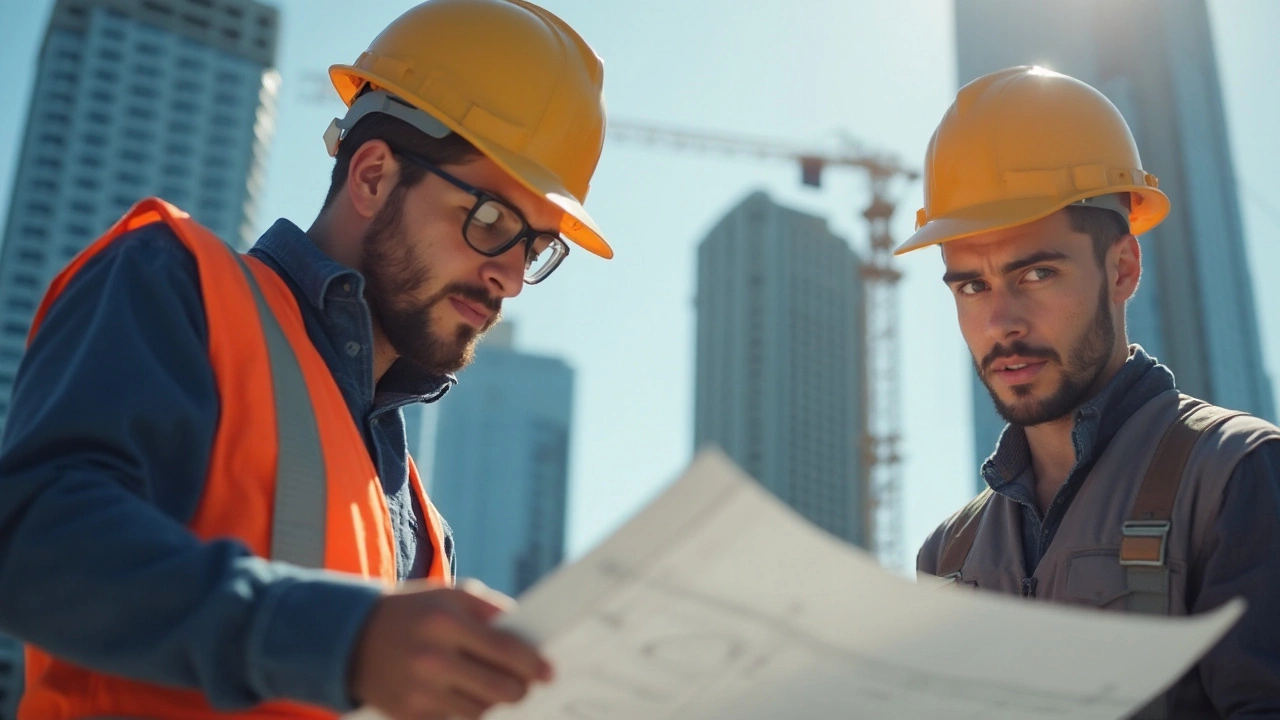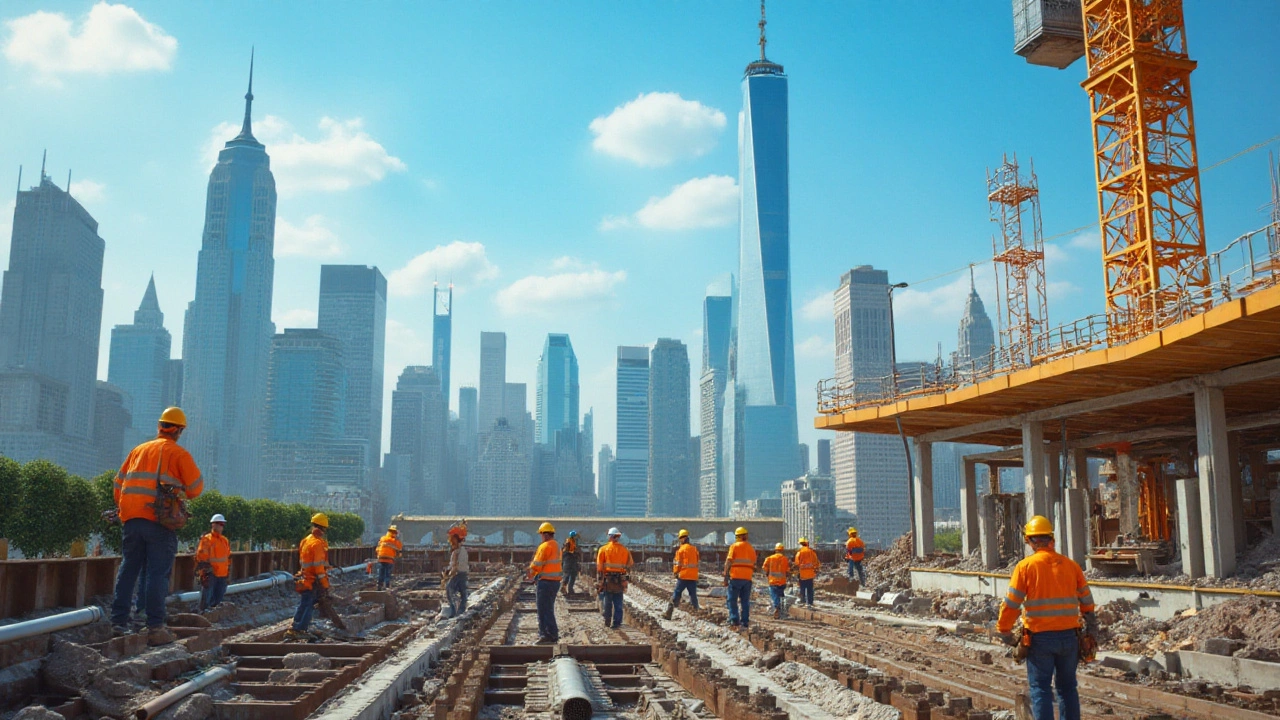In the ever-evolving construction industry, finding the right contractor can make all the difference. The US is teeming with skilled professionals and established companies who are shaping the skylines of cities and crafting the spaces we live, work, and play in.
This article dives deep into the world of construction contracting, spotlighting some of the finest in the business. From firms renowned for their landmark projects to those pushing the envelope with innovative techniques and sustainable practices, we aim to provide a clear picture of who stands out in this bustling sector. Whether you're a property developer or simply curious about how our built environment takes shape, understanding these construction giants is essential.
- Industry Leaders
- Innovative Technologies
- Customer Satisfaction
- Tips for Choosing the Right Contractor
Industry Leaders
In the bustling realm of American construction, certain companies have risen to prominence, carving out a distinct identity with their innovation, scale, and influence. Among these, a few names are synonymous with excellence and are leading the charge in reshaping the construction landscape. Turner Construction, Bechtel, and Fluor Corporation stand tall not just as top-tier players but as pioneers setting benchmarks in technological integration and sustainability practices in the industry.
Turner Construction, with its strong roots since 1902, is lauded for its diverse portfolio and significant projects that range from iconic skyscrapers to intricate medical facilities. The company's project management system has earned them a reputation for efficiency and safety, areas in which they are continually refining processes to align with modern standards. US builders have often cited Turner as an innovator, pushing boundaries by incorporating cutting-edge digital tools like Building Information Modeling (BIM) and leveraging data for predictive analytics to mitigate risks and streamline operations.
Bechtel, another giant, has distinguished itself on a global scale with its expansive services covering infrastructure, mining, nuclear security, and environmental clean-ups. Established in 1898, this family-run business has been a fixture in major projects that define USA construction. Their ability to handle colossal projects is well illustrated by their involvement in the Crossrail project in London and various international airports' upgrades. Bechtel's commitment to sustainable practices is reflected in their implementation of renewable energy projects and their pledge towards reducing carbon footprints on all their undertakings.
"Bechtel is continuously evolving, not just to build better, but to build responsibly," remarked Brendan Bechtel, emphasizing the company's dedication towards environmental stewardship and corporate responsibility.
Fluor Corporation, with its origins tracing back to 1912, has a rich history of delivering integrated solutions across industrial sectors, engineering designs, and managing resources efficiently. Known for comprehensive compliance and ethical standards, Fluor invests significantly in employee growth and technological adoption to maintain its edge. Their focus on safety and quality assurance has made them a preferred partner for government contracts and private ventures alike.
Examining these best contractors, one can see a pattern of continuous adaptation and leadership in embracing technological advancements. Whether it's through digital transformation initiatives, such as using AI and IoT for smart construction, or commitments to reduce environmental impact, these industry leaders set the bar high. The construction field is vast, and with these titans paving the way, the future of construction in the US promises not just growth but also a dedication towards a more efficient and sustainable world.

Innovative Technologies
The landscape of the construction industry has transformed dramatically due to the continuous integration of innovative technologies. These advancements are not only enhancing the quality and efficiency of projects but are also reshaping the way contractors approach construction. At the forefront is Building Information Modeling (BIM), a tool that goes beyond 3D modeling by involving data management throughout the lifecycle of a building. Contractors in the USA utilize BIM to streamline collaboration among architects, engineers, and builders, essentially creating a cohesive blueprint that reduces errors and saves time. The technology is proving significantly effective in complex infrastructural projects, where precision and detail are crucial.
Another remarkable innovation making waves is the use of drones and aerial vehicles in construction. They provide site managers with an aerial perspective that is crucial for land surveys and ongoing site inspections. Drones enhance safety by reducing the need for workers to physically enter potentially hazardous areas, while also providing detailed imaging that is invaluable for real-time analysis and monitoring. With advancements in drone technology, many top contractors are investing in these devices as part of their standard operations.
3D printing is another transformative technology gaining a foothold in the industry. From its initial use in creating basic components to now designing full-scale structural elements, 3D printing presents a future where on-site custom fabrication becomes routine. This technology not only decreases material waste but also increases construction speed, allowing builders to meet ever-tightening deadlines. As the tech advances, its potential applications are expanding, offering a new world of possibilities to construction firms looking to reduce costs and enhance creativity.
Robotic automation is also revolutionizing construction. Machines that can lay bricks, tie rebar, and even perform finishing tasks are starting to share the workload traditionally carried out by human laborers. With robots, contractors are achieving unprecedented levels of precision, efficiency, and safety. As Tony Radford of Construction Robotics notes, "The future of construction lies in the seamless integration of human ingenuity with robotic precision," which underscores the growing movement towards automation in the industry.
The use of sustainable materials and practices has seen a significant rise as contractors embrace environmental responsibility. Green building technologies, such as energy-efficient designs and the use of recycled or renewable materials, are increasingly becoming standard to meet the demands of eco-conscious clients. This shift not only benefits the environment but also offers long-term cost savings through reduced energy consumption. In a world where sustainability is more important than ever, construction companies are finding ways to balance growth with ecological stewardship, setting a precedent for future industries.
In illustrating the impact, a recent survey showed that approximately 75% of construction firms have integrated at least one form of new technology into their processes over the past year. This adoption is an indicator of the industry's direction toward embracing technological innovation as a key driver of success.

Customer Satisfaction
When it comes to the construction industry, achieving a high level of customer satisfaction is a crucial marker of success. This concept goes beyond merely meeting deadlines and budgets; it revolves around building trust, fostering communication, and delivering quality with consistency. In the US, top construction companies often have dedicated teams focused solely on client relations, ensuring that every stakeholder involved feels heard and valued throughout the project's lifecycle. Companies such as Turner Construction, Bechtel, and Fluor Corporation have set benchmarks in this domain by creating tailor-made solutions and providing a seamless experience for their clients.
Customer satisfaction starts with understanding the client's vision. The best contractors make it a priority to engage in comprehensive discussions to align their services with their client's specific needs and expectations. This can include everything from architectural preferences to sustainable building practices. Strong communication channels are established early in the process; these channels serve as conduits for updates, feedback, and any required adjustments, ensuring both parties remain in sync. An efficiently run project with no surprises often results in highly satisfied clients who are eager to work with the contractor again or recommend their services.
Another important aspect of customer satisfaction in construction is the quality of craftsmanship. The leading US builders are known for maintaining stringent quality control measures that translate into superior outcomes. When a customer sees exquisite finishes and solid construction, they not only appreciate the beauty but also feel secure about the long-term durability of their investment. For instance, Turner Construction has been lauded for their meticulous attention to detail, which was spotlighted when they crafted the iconic J.P. Morgan Chase Tower in New York. This approach goes a long way in not just constructing a building, but also solidifying a company's reputation in the market.
Carl Elefante, a noted architect, famously said, "The greenest building is the one that already exists." This illustrates the importance of sustainable practices in driving customer satisfaction as well. Modern clients are increasingly favoring contractors who prioritize eco-friendly construction methods, drastically reducing the environmental footprint of their projects. By focusing on sustainability, top construction firms are appealing to a rapidly growing segment of environmentally conscious clients who value these efforts overwhelmingly.
To gauge customer satisfaction accurately, many firms rely on post-project surveys and feedback mechanisms. By analyzing this data, companies gain actionable insights into areas where they excel and aspects needing improvement. These insights are vital in refining their processes and policies, ultimately enhancing their customer satisfaction levels with each subsequent project. Additionally, satisfied customers are equated with positive word-of-mouth marketing, which is invaluable in an industry where recommendations often weigh heavily on contract decisions. As such, firms that nail client satisfaction not only secure loyal customers but also expand their client base organically through referrals.

Tips for Choosing the Right Contractor
Selecting the right contractor for your construction project can be a bit like embarking on a journey. It's all about partnerships that build trust, ensuring that every brick laid is a step toward your vision. Imagine you have this grand architectural idea in your head, and you want someone who not only sees it but also understands all the intricacies involved in making it a reality. You need a contractor who merges precision with creativity, where their skillset is as vast as your dreams. This section will walk you through essential tips to help you identify a contractor who delivers quality, manages efficiently, and, most importantly, respects both your time and budget.
Start by researching the top construction companies in your area. It's an undeniable fact that a contractor's reputation is his calling card. Look into well-known names but don't shy away from learning about upcoming talents in the industry who might offer fresh perspectives. Check reviews on social media, construction forums, and from past clients. High praise or poignant criticisms can guide you on what to anticipate. Ask for references and speak to former clients about their experiences. This kind of insider information can be invaluable in understanding the contractor's strengths and potential weaknesses.
"The bitterness of poor quality remains long after the sweetness of low price is forgotten," cautioned Benjamin Franklin. This timeless wisdom resonates in construction, where cost-cutting can lead to compromised results.
After gathering your information, delve into their portfolio. A comprehensive portfolio can tell you about their versatility, previous projects, and whether they have experience handling projects similar to yours. Look for diversity in styles and a keen sense of detail. Each project, whether commercial or residential, demands a distinct approach and specific skills, so find out if they’ve dabbled in environments akin to what you envision. Furthermore, make sure that their ethos and practices align with your priorities. For instance, if sustainable building is a must-have for you, search for contractors with green certifications and practices in place.
Budgeting is another critical factor. Be transparent about your budget from the outset. Honest communication around finances can prevent disillusionment down the line. It's common knowledge in the industry that quotes can be as varied as the designs themselves, hence getting multiple estimates is a smart move. A detailed quote highlights transparency and reveals potential hidden costs. Remember, choosing the cheapest option could mean sacrificing important elements that reflect quality and durability. Make sure that there's an understanding about unexpected expenses and how they will be managed.
Never underestimate the power of rapport and communication. Establishing a good relationship throughout the project is just as crucial as the initial build. Observe how they engage during your initial meetings. Are they responsive? Do they listen and convey their thoughts effectively? A professional contractor should prioritize consistent communication, keeping you informed about the progress, delays, changes, and any other pertinent issues. Compatibility in working styles and open dialogue will often decide whether the project progresses smoothly or stalls frequently.
Lastly, scrutinize the legal aspects. Confirm that your contractor possesses necessary licenses and insurance coverage. This is not just a formality, but a safeguard for your project and peace of mind. Check for any history of disputes, as it might indicate potential areas of conflict. Read the contract carefully to comprehend all clauses, warranties, and terms regarding completion timelines. A meticulously drafted contract ensures clarity and fortifies the commitment agreed upon by both parties.
In summary, selecting the right contractor involves methodical research and astute judgement. It's about architectural harmony between you and the builders. From assessing their legacy and portfolio to confirming credibility through formal paperwork, each step is a cornerstone in your project's foundation.
